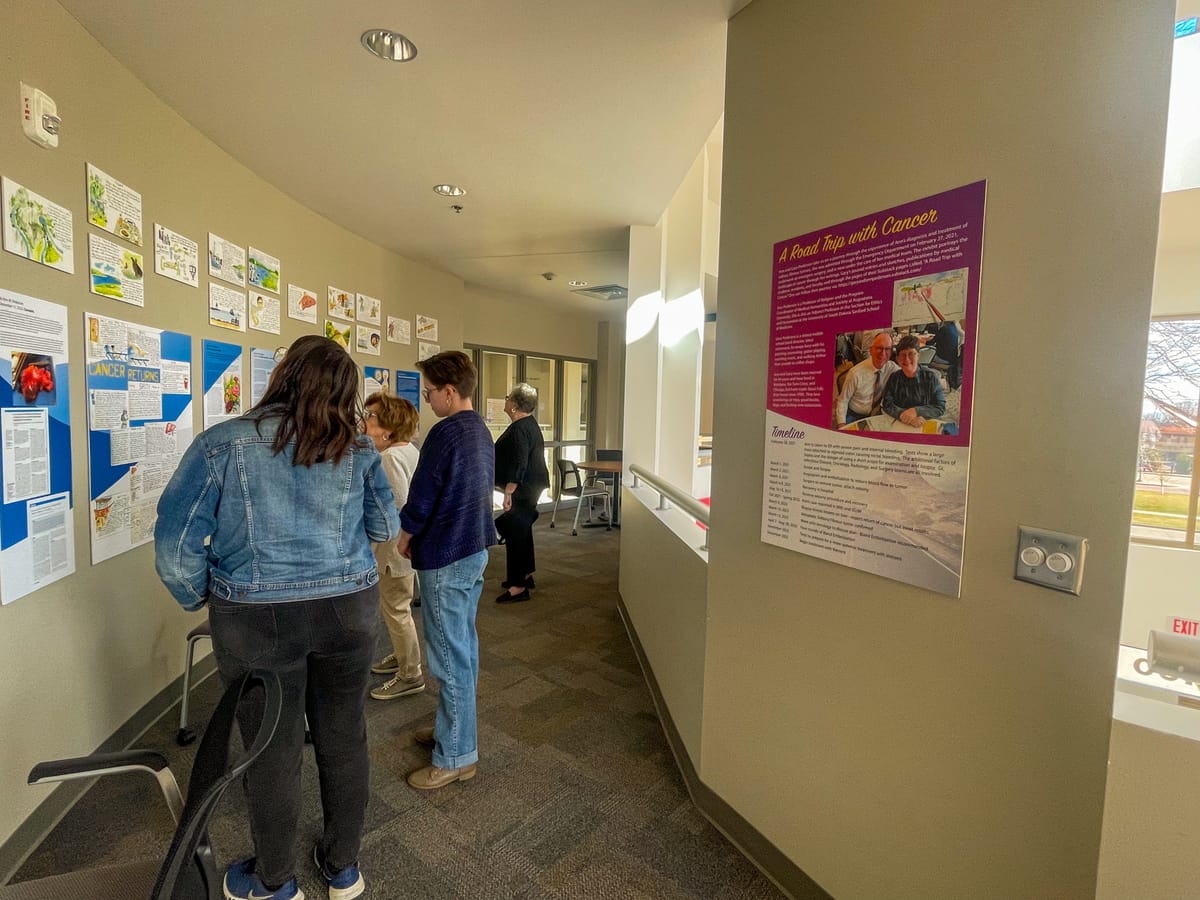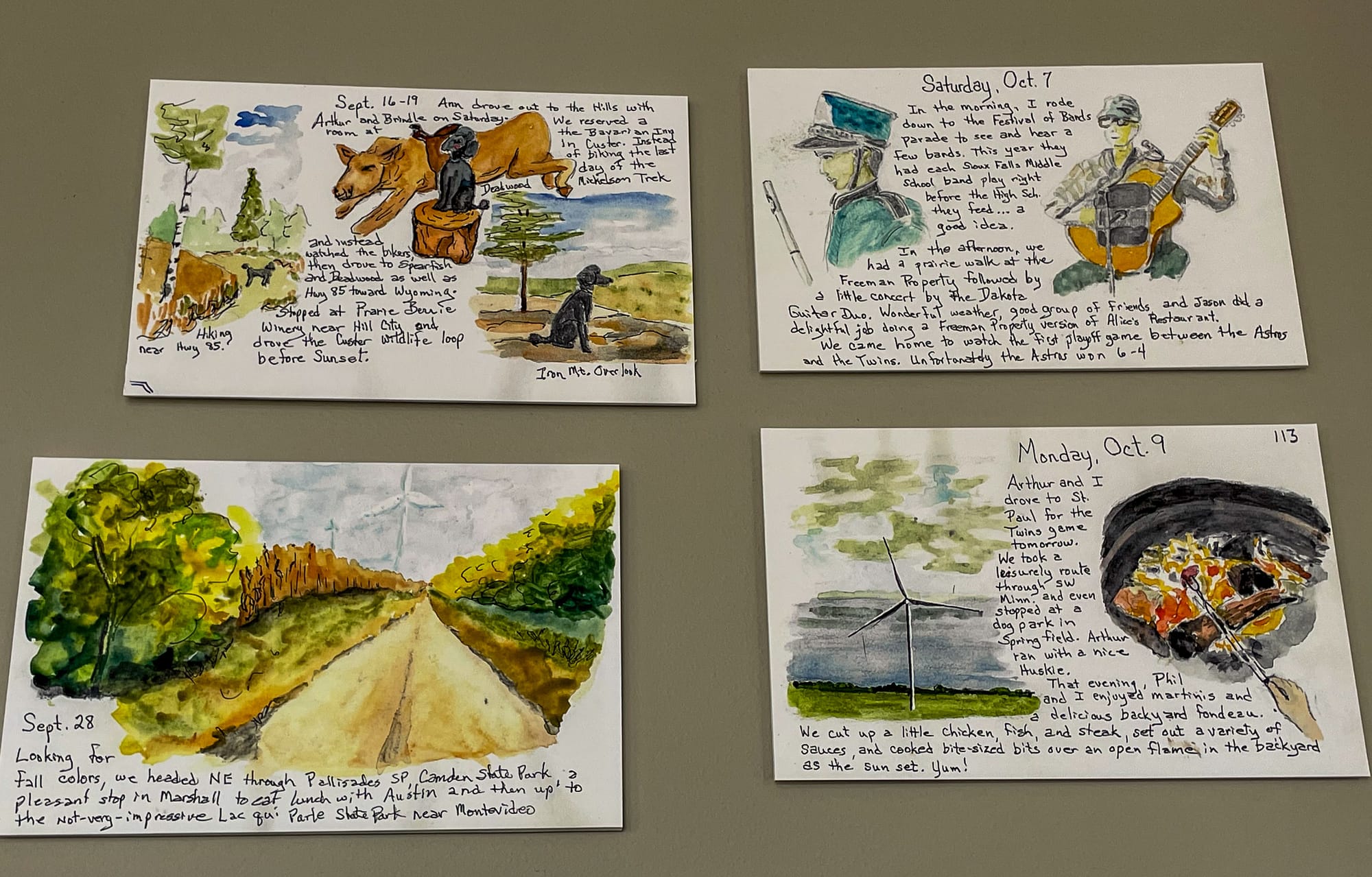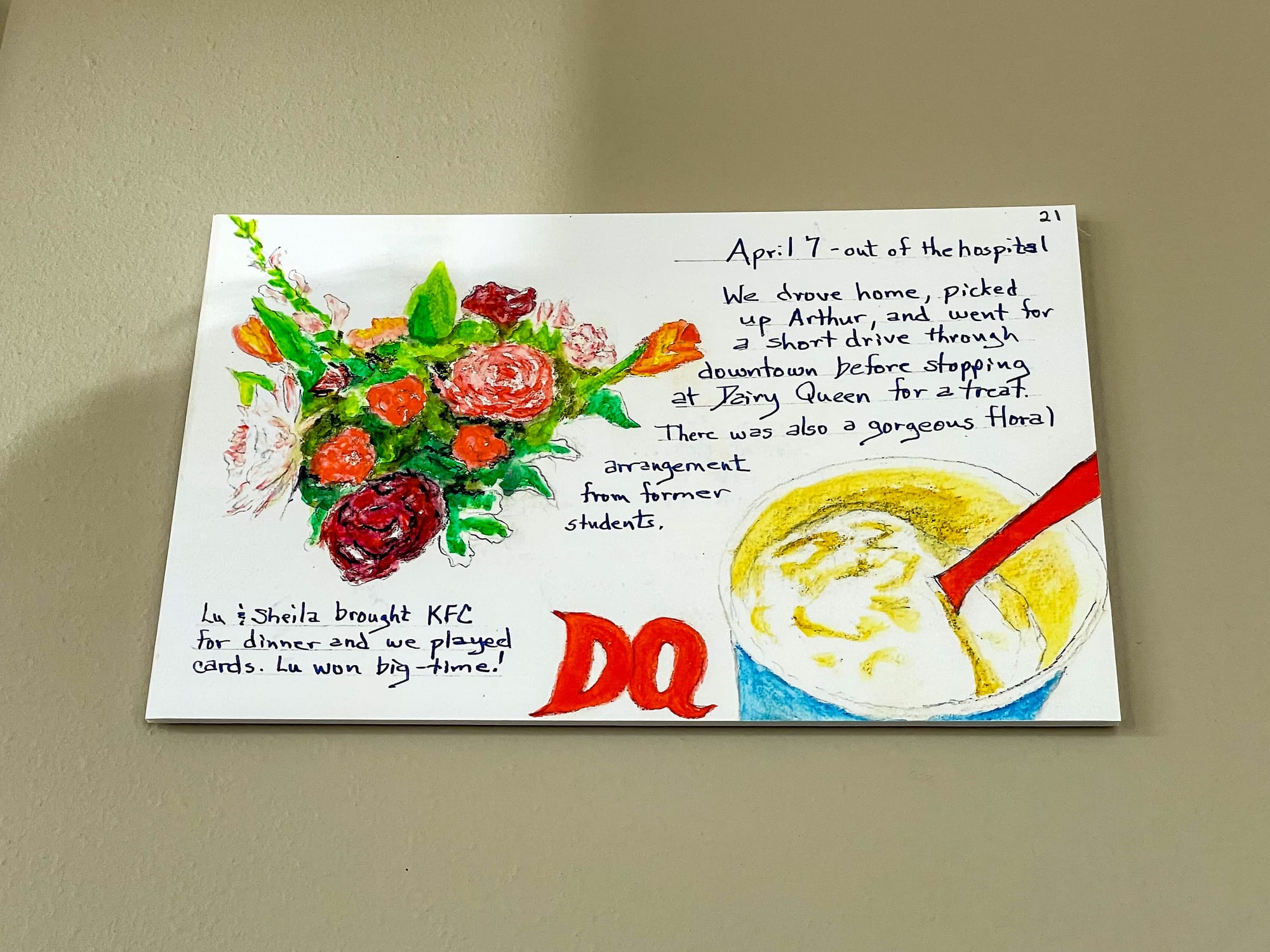Art exhibit illustrates professor’s ‘roadtrip with cancer’

This spring, religion professor Ann Pederson used her knowledge of teaching and living with cancer to create an art exhibit with her husband, hoping to educate individuals about her journey.
The exhibit, “A Roadtrip with Cancer,” will be available at the University of South Dakota Sanford School of Medicine until June. The gallery features Pederson’s writings, her husband Gary Pederson’s journal entries and sketches, and publications of medical students, residents and faculty.
Upon the exhibit’s walls are images, which are saddled alongside hand-written text and intricate drawings. Each photo accompanies a journal entry that discusses the complex emotions of someone who has cancer, coming from the perspective of someone who supports them. Most of the artwork on the pages includes images of landscapes and portraits of the Pedersons’ standard poodle named Arthur.
Senior Cailey Scott, an English and religion major, visited the exhibit with her friend on April 10.
“When we visited, we stood in silence for a long time, just taking it all in,” Scott said. “Dr Pederson is our professor and mentor, yes, but she has also become a valuable friend. To see how she has dedicated herself to visually displaying her journey with cancer… is truly remarkable.”
Scott said she learned a lot from the exhibit, which she described as interesting and thought-provoking.
Many attendees, including Scott, left the display in moments of reflection.
“I left the art display feeling heavy but also filled with wonder, awe and almost a hint of joy,” Scott said. “I think it was really just a great reminder of the resilience of the human spirit.”
Pederson was diagnosed with a solitary fibrous tumor in March 2021, after she went to the hospital experiencing a high fever and chills, which she believed to be side effects of her recent COVID-19 vaccination.
“I went into the emergency room and came out 10 days later with a giant tumor we call ‘the thing,’ about the size of a football,” Pederson said.
Pederson said “solitary fibrous” means any cell could have grown the tumor. She also said genetic testing showed that she has a gene that makes her prone to multiple types of cancer. Eight years ago, she had breast cancer and then got melanoma from the radiation treatment, a rare response to the treatment. Her current tumor was “totally out of the blue,” she said.
“Yes, you intend to take a journey [with a disease], but with this, the cancer took us,” Pederson said.
Pederson’s case is rare. She said about one in a million people are diagnosed with solitary fibrous tumors each year.
From March 2021 to March 2023, Pederson was cancer free. Last spring, she was diagnosed with a solitary fibrous tumor again, now in her liver.
Gary Pederson, an artist, would bring his journal to his wife’s appointments or write about them afterward, detailing his thoughts and emotions in an attempt to try and understand what she was going through.
One of the entries in the exhibit features a drawing of a floral arrangement alongside a cup of ice cream, with the text detailing how the couple had gotten Dairy Queen and were welcomed home with bouquets sent from former students. The journal entry ends with the two playing cards after dinner.


Gary Pederson's artwork and the couple's writings hang on the walls of the University of South Dakota Sanford School of Medicine. Photos by Madisyn Stogsdill.
During the Pedersons’ remarks at the exhibit on April 10, they discussed their different perspectives: an individual experiencing cancer and the other a supporter of someone who has it.
“I think it has been tough for us sometimes to deal with the cancer,” Pederson said. “Obviously, the situation three years ago [with the tumor] was such a dire emergency that we just got handed that rather quickly.”
However, the couple has been together for about 45 years. While “every marriage has its ups and downs,” Pederson said, mutual interests have sustained their relationship.
One of those interests has been their faith.
“Our faith has bonded Gary and I together for sure,” Pederson said.
Pederson said that it’s not just their Christian faith, though.
“It’s really letting go into the mystery of God,” Pederson said. “I don’t think really either of us stopped asking the big questions because they don’t seem to get us anywhere, you know, why this happened or what. It’s just more letting go and learning to live in the moment and trust God’s grace. That’s about all I can do.”
Pederson became an ordained pastor in 2007, which led to her teaching position at Augustana. She said her faith has also experienced “ups and downs.”
“My home is Christian Lutheran, but my wanderings are all over the place,” Pederson said. “I think doubt towards religion is not that there is a God, but of how he relates to the world. Cancer is a disease of evolution, and that means I have to learn not to be angry but to dig deeper and lean into the grace and mercy of God.”
To help with a sense of stability during such an unpredictable time, Pederson said she and her husband still plan to go on plenty of road trips. Finding both the outdoors and driving to be good for fostering conversations, their mutual love for exploring new places has persisted.
“As we began this journey, we decided we’ll continue what we always do, which is our road trips,” Pederson said. “Our love to travel gets you onto our ‘road to cancer.’ We have tried to use [this] as a means to live fully present in the moment.”
According to English and journalism professor Janet Blank-Libra, Pederson’s close friend, the Pedersons are always jumping in the car.
“They go somewhere just about every weekend,” Blank-Libra said. “They’re an inspiration. Ann came to Augustana a mountain woman. Now, she’s a prairie child. And a mountain woman.”
The couple plans to tackle national parks this upcoming summer while Pederson waits on results from her medical team. She will be going to the Mayo Clinic on April 29 to meet with a sarcoma specialist team.
Pederson said she will have three-month windows between CT scans. During the in-between time, Pederson said she and her husband will know she has an open schedule before finding out what the next treatment or medication might be, giving them time to travel.
“Now we have to [travel] more spontaneously because of my health,” Pederson said.
Pederson uses traveling as motivation and said hobbies can tell a person a lot about what other individuals are going through.
“If you ask somebody, ‘Who are you?’ ask them to tell you how they spend their days,” Pederson said.
Pederson derived this concept from Annie Dillard’s “The Writing Life,” in which she writes “How we spend our days is, of course, how we spend our lives. What we do with this hour, and that one, is what we are doing."
Pederson said one way people can ask how they know themselves is to ask what they are doing.
“We are of course more than our doings, but how we live each day says something important about who we are,” Pederson said.
Pederson’s doings have reflected her curiosity and generosity, according to Blank-Libra.
“Even as she is the one who is suffering from cancer, she is looking out for other people,” Blank-Libra said. “She knows that this is painful for those who love her, and she does her very best to be her usual engaging self. She's attentive to other people's needs, and I think that that's something of a gift because it would be really easy to do otherwise.”
To stay up to date with findings and new journal entries, people can subscribe to the Pedersons’ substack, which includes images of art, their travels and their pet toy poodle.
“I think at my age, I’ve learned that chronic worrying doesn’t bring you much happiness. When [the cancer] happened and I was so close to death, I think the worrying made me realize I was missing out on stuff, especially relationships with people,” Pederson said.



